How To Choose The Right Materials for CNC Machining? -Material Selection Guide
Selecting the right material for CNC machining is critical for achieving your design goals, whether you’re creating high-precision prototypes or durable end-use parts. Each material offers unique advantages and trade-offs, from machinability to strength and cost. This guide will walk you through how to evaluate your requirements and choose the best material for your project.
At VMT, we specialize in providing customized CNC machining services with precision tolerances up to 0.01mm. Let’s dive into how you can leverage our expertise to make the right choice.
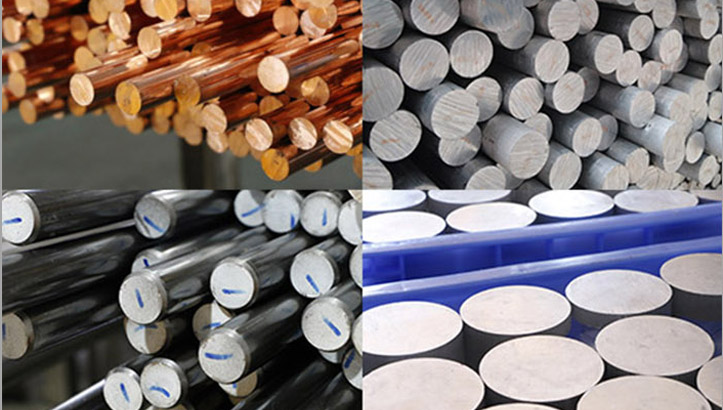
Common Metal for CNC Materials
CNC machining holds a prominent place in the manufacturing sector for processing a wide range of materials, with plastics standing out due to their attributes such as being lightweight, corrosion-resistant, insulating, and cost-effective. When it comes to materials like aluminum, selecting the best aluminum for machining is crucial to achieving high precision and efficiency. Among the plastic materials frequently used in CNC machining are acrylic, nylon, and polycarbonate. Similarly, aluminum alloys like 6061 and 7075 are highly favored for their exceptional machinability and adaptability, making them the best aluminum for machining in many applications. Common metal materials processed by CNC mainly include the following:
Aluminum 6061
Aluminum material grades encompass a wide range of alloys, each with unique properties and applications, such as Aluminum 6061 is a versatile alloy known for its excellent mechanical properties and corrosion resistance. This material is commonly used in aerospace, automotive, and marine applications due to its lightweight nature and good machinability. It can be easily welded and formed, making it a preferred choice for custom parts. Additionally, Aluminum 6061 is available in various tempers, allowing for specific strength requirements. Its availability and cost-effectiveness further enhance its appeal for CNC machining projects.
Aluminum 7075
Aluminum 7075 is recognized for its high strength-to-weight ratio, making it a go-to choice for applications requiring exceptional durability, such as in military and aerospace industries. This alloy offers superior resistance to stress corrosion cracking and is ideal for applications where weight reduction is critical. However, its machinability is slightly lower than that of 6061, which may lead to increased production costs.
Brass
Brass is a copper-zinc alloy known for its excellent machinability and corrosion resistance. It’s commonly used in the production of fittings, valves, and musical instruments due to its aesthetic appeal and acoustic properties. Brass can be easily shaped and worked, making it ideal for complex CNC machining operations. Additionally, its antimicrobial properties make it suitable for applications in medical devices and plumbing systems.
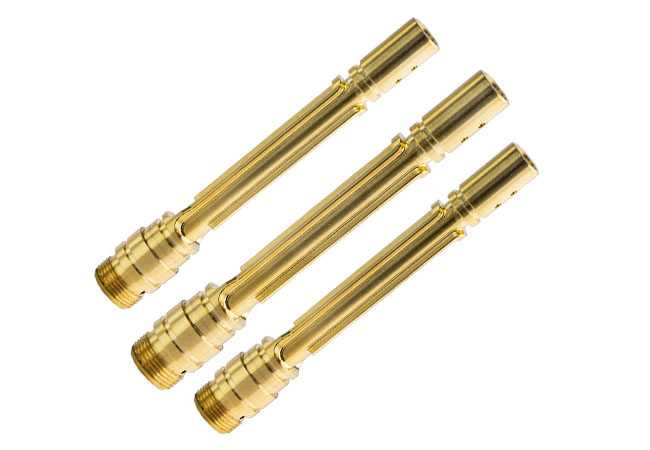
Magnesium AZ31
Magnesium AZ31 is a lightweight alloy known for its good machinability and strength. It is often used in automotive and aerospace applications where weight reduction is crucial. This material has excellent corrosion resistance, making it suitable for outdoor and marine environments. However, care must be taken during machining, as magnesium can be flammable when chips are created. Proper cutting tools and techniques are essential for safe processing.
Stainless Steel 303
Stainless Steel 303 is known for its ease of machining and excellent corrosion resistance, making it a popular choice in the food processing and medical industries. This alloy is non-magnetic and can withstand various environmental conditions. While it is slightly less strong than other stainless steels, its machinability makes it a go-to option for precision parts where intricate designs are necessary. When selecting 303, consider its applications and the importance of surface finish.
Stainless Steel 304
Stainless Steel 304 is the most widely used stainless steel alloy due to its excellent corrosion resistance and good formability. It is ideal for applications in chemical processing, food and beverage, and architectural fields. Although it is not as easy to machine as 303, advancements in tooling have made it feasible to work with. Its high strength and durability make it suitable for demanding environments, ensuring a long service life.
Stainless Steel 316
Stainless Steel 316 offers superior corrosion resistance, particularly in harsh environments such as marine applications. Its molybdenum content enhances its resistance to pitting and crevice corrosion. This alloy is often used in medical devices, pharmaceuticals, and food processing industries. While machining 316 can be more challenging due to its toughness, proper tooling and techniques can yield excellent results.
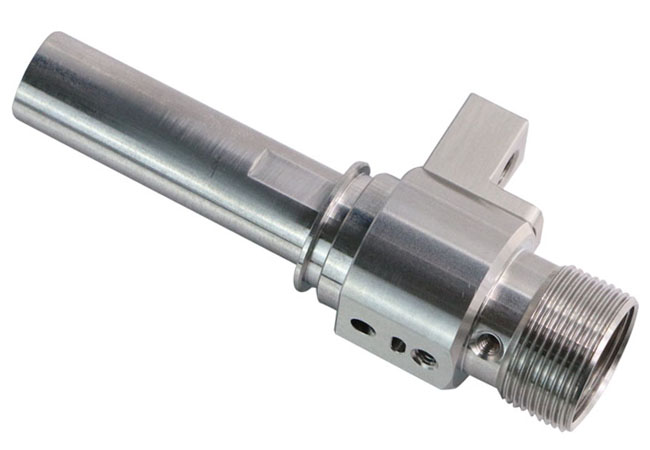
Carbon Steel 1045
Carbon Steel 1045 is known for its strength and hardness, making it suitable for applications requiring high tensile strength. This material can be easily machined and is often used in manufacturing gears, shafts, and axles. It is essential to consider the heat treatment process for this steel to achieve desired properties. Its affordability and availability make it a practical choice for various CNC machining projects.
Titanium
Titanium is renowned for its exceptional strength-to-weight ratio and corrosion resistance, making it ideal for aerospace and medical applications. However, its machining can be challenging due to its toughness and tendency to work-harden. Specialized tooling and machining strategies are necessary for efficient processing. Despite its higher cost, titanium is often chosen for applications where performance is paramount.
Material Spotlight: Aluminum 7075 vs. Titanium
Aluminum 7075 and Titanium are both popular materials, but they serve different purposes due to their distinct properties. Aluminum 7075 is favored for its excellent machinability and moderate strength, making it a common choice for automotive parts and aerospace components.
Titanium offers superior strength and durability, particularly in extreme environments, but comes at a significantly higher cost. While Aluminum 7075 is often used where weight and ease of machining are key factors, Titanium is preferred for applications where high strength and resistance to corrosion are critical.
Common Plastic for CNC Materials
CNC machining is widely used in the manufacturing industry for the machining of various materials, among which plastic materials are widely used due to their advantages such as light weight, corrosion resistance, insulation, and low cost. The following are several common plastic materials used in CNC machining:
ABS
Acrylonitrile Butadiene Styrene (ABS) is a thermoplastic known for its impact resistance and durability. It is widely used in consumer products, automotive components, and electronic housings. ABS is easy to machine and can be easily colored or finished to achieve desired aesthetics. Its excellent balance of strength and flexibility makes it a popular choice for prototypes and functional parts.
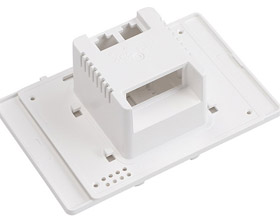
Nylon
Nylon is a versatile engineering thermoplastic known for its strength, toughness, and abrasion resistance. It is commonly used in applications requiring low friction and wear, such as gears, bearings, and bushings. Nylon can absorb moisture, which may affect its dimensional stability, so consider this factor during material selection.
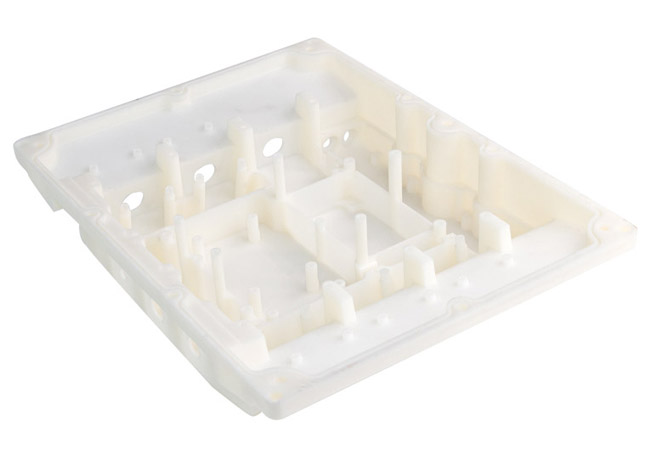
PMMA Acrylic
Polymethyl Methacrylate (PMMA), commonly known as acrylic, is a transparent thermoplastic known for its optical clarity and UV resistance. It is often used in applications such as displays, light fixtures, and signage. PMMA is easy to machine and can be polished to achieve a high-gloss finish. Its lightweight nature and shatter resistance make it an ideal alternative to glass in various applications.
UHMWPE
Ultra-High Molecular Weight Polyethylene (UHMWPE) is a durable and low-friction material often used in applications requiring excellent wear resistance. It is commonly found in conveyor systems, medical devices, and marine applications. UHMWPE can be machined into intricate shapes and offers high impact strength. Its chemical resistance and ability to perform in extreme temperatures make it suitable for diverse environments.
PEEK
Polyether Ether Ketone (PEEK) is a high-performance thermoplastic known for its exceptional thermal stability and chemical resistance. It is often used in aerospace, automotive, and medical applications. PEEK’s high strength and low friction properties make it suitable for demanding applications where performance is critical. Although it can be more challenging to machine, specialized tooling can yield precise and reliable results.
Top Materials Used in CNC Machining
| Material | Key Features | Best Applications | Limitations |
|---|---|---|---|
| Aluminum 6061 | Lightweight, corrosion-resistant, machinable | Electronics, automotive, prototypes | Limited wear resistance |
| Stainless Steel | Corrosion-resistant, strong | Aerospace, medical, marine applications | High cost, slower machining |
| ABS Plastic | Low-cost, easy to machine | Consumer goods, early-stage prototyping | Lower strength and heat resistance |
| Titanium | High strength, heat and corrosion-resistant | Implants, aerospace components | Expensive, difficult to machine |
| PEEK | Heat-resistant, excellent mechanical properties | Medical devices, chemical processing | High cost |
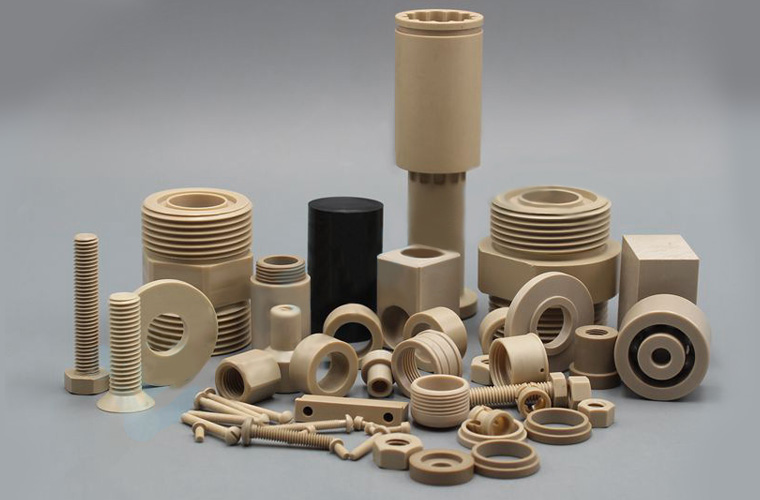
Other CNC Machining Materials
In addition to metals and plastics, other materials such as composites and ceramics are also utilized in CNC machining.
| Material Name | Characteristics | Application Areas |
| Phenolic Resin | Good insulation, heat resistance, corrosion resistance | Electrical, electronic, mechanical, and other fields |
| Carbon Fiber Composite | High strength, low density, corrosion resistance, high temperature resistance | Aerospace, automotive, sporting goods, and other fields |
| Glass | High transparency, high hardness, good chemical stability | Optical instruments, glass products, and other fields |
| Ceramic | High hardness, high temperature resistance, corrosion resistance | Aerospace, medical, chemical, and other fields |
| Rubber | Good elasticity, wear resistance, chemical corrosion resistance | Automotive, mechanical, electronic, and other fields |
How To Choose The Right CNC Machining Materials? Our Step-by-Step Guidelines
When selecting materials for CNC machining, several key factors must be considered to ensure optimal performance and cost-efficiency.
Moisture
Consider the moisture levels of the environment where the machined parts will be used. Materials like wood and some plastics can absorb moisture, causing dimensional changes and decreased performance. Therefore, for applications exposed to varying humidity levels, opt for materials with low moisture absorption.
Strength and Durability
Evaluate the strength requirements of your project, as different materials offer varying levels of tensile strength and toughness. For high-stress or load-bearing applications, choose materials known for their strength properties, such as high-strength aluminum alloys, carbon steels, stainless steel 304, or titanium. Stainless steel 304 is durable and resistant to wear and tear, making it perfect for aerospace and medical applications, while titanium is known for its exceptional strength-to-weight ratio. However, titanium is slower to machine. If your product requires a balance of strength and cost-effectiveness, carbon steel is a strong contender.
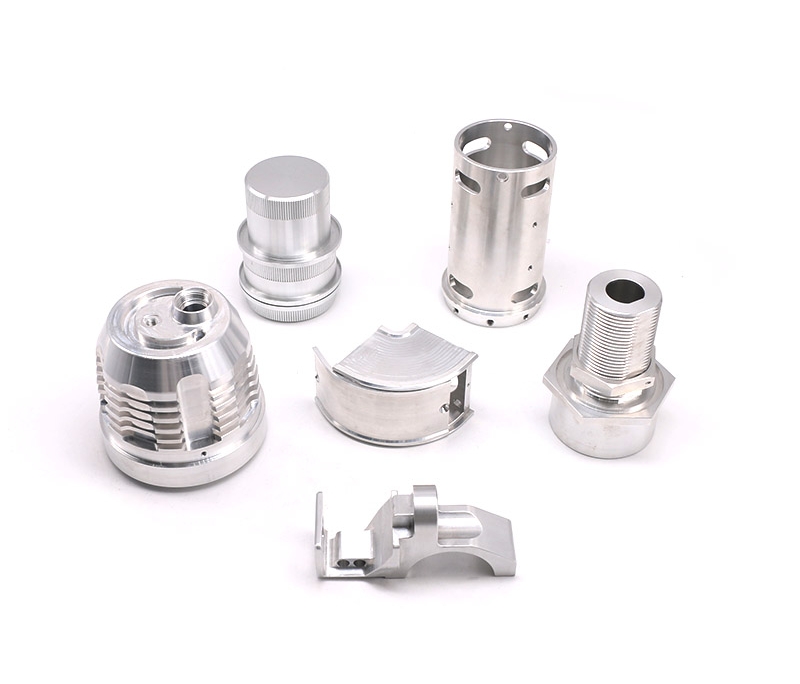
Heat
Consider the heat resistance of the materials, especially if the components will be subjected to high temperatures. Materials like titanium and stainless steel maintain their structural integrity under thermal stress, while certain plastics may deform at elevated temperatures.
Machinability
The ease of machining is a significant factor in material selection. Materials with high machinability, such as aluminum 6061 and brass, are easier to cut and finish, reducing production time and tool wear. Aluminum 6061 is ideal for prototyping, while brass offers smooth machining and is commonly used in decorative or electrical components. Choose materials that align with your CNC machining capabilities to ensure efficient production.
Cost
Balance your project’s requirements with budget constraints to select materials that provide the best value without compromising quality. For high-volume production runs, prioritize materials that balance cost and machinability, such as ABS plastic and aluminum. Premium materials like titanium and Inconel (used for aerospace-grade components) may offer superior properties but come with increased costs.
Surface Finish Requirements
The finish impacts both the aesthetics and functionality of the machined parts. Materials like aluminum can be easily anodized for a sleek look, while plastics like ABS can be painted or polished but may require additional smoothing due to visible tool marks. For example, aluminum 7075 is often chosen for smartphone casings due to its ability to achieve high-gloss finishes after anodizing.
Environmental Factors
Ensure the selected materials can withstand their operating environment. Consider heat resistance, corrosion resistance, and other environmental factors. Materials like titanium and Inconel offer excellent heat resistance, while stainless steel 316 and anodized aluminum provide corrosion resistance.
Selecting the Right Materials for CNC Machining: Common Use Cases
1. Electronics Industry
In the electronics industry, the challenge often lies in creating components that are lightweight, durable, and precise, such as smartphone parts. Materials like Aluminum 6061 or 7075 are commonly chosen for these applications due to their excellent machinability, high precision, and cost efficiency. These materials ensure the production of high-quality components that meet the intricate demands of modern electronics.
2. Medical Implants
For medical implants, the primary focus is on developing biocompatible parts that resist corrosion while providing strength and longevity. Titanium is the material of choice here due to its unique properties, including high strength, resistance to corrosion, and excellent biocompatibility. These attributes make titanium ideal for medical implants, ensuring patient safety and the durability of implants over time.
3. Aerospace Applications
In aerospace manufacturing, achieving strength-to-weight efficiency is crucial for components that must withstand extreme conditions such as high temperatures and stress. Materials like Inconel and carbon fiber composites are preferred for their ability to endure extreme heat and pressure. These materials provide the necessary strength, reliability, and performance for critical aviation components, ensuring safety and operational efficiency in aerospace applications.
In Conclusion
Choosing the right materials for CNC machining is critical for achieving optimal performance and cost-effectiveness.
Looking for a versatile and powerful desktop CNC mill capable of handling steel and other robust materials? Our state-of-the-art desktop CNC milling machines are designed for precision and durability, making them perfect for small to medium-sized metalworking projects. Whether you’re a hobbyist, small business owner, or engineer, our mills can tackle a wide range of materials, including steel, aluminum, brass, and more.
Whether you’re milling small metal parts, producing components for submarines, or simply exploring the world of milling materials, we have the tools and expertise to help you succeed.
Frequently Asked Questions About The Right Materials for CNC Machining
Can Wood be CNC Machined?
Yes, wood can be CNC machined. CNC machining is an important automated machining technology in modern manufacturing. It uses a computer program to control the movement of machine tools, enabling high-precision, high-efficiency, and complex shape machining of parts. Wood, as a lightweight and easily processed material, is suitable for CNC machining.
What are the Most Commonly Used Materials in CNC Machining?
The most commonly used materials in CNC machining include various metals such as aluminum (6061 and 7075), stainless steel (304, 316), brass, carbon steel (1045), and titanium. These materials are favored for their strength, durability, and machinability. In addition to metals, plastics like ABS, nylon, PMMA acrylic, UHMWPE, and PEEK are also frequently used, especially for applications requiring lightweight components or specific chemical resistance.
How Does Material Selection Affect the Cost of CNC Machining?
Material selection in CNC machining significantly impacts costs due to variations in procurement prices, machining efficiency, post-processing needs, waste rates, and supply chain complexities. By considering factors such as mechanical properties, machinability, corrosion resistance, thermal stability, and overall cost alongside application requirements and operating environments, engineers can optimize both performance and cost-effectiveness.
Is CNC Machining Hard?
Yes, CNC machining can be considered hard or challenging, especially for those who are new to the field or are working on complex projects. It requires a good understanding of both the machinery and the software used to program it, as well as a strong attention to detail and precision. However, with proper training and experience, many individuals can become proficient in CNC machining.
What is the Easiest Material to Machine?
Aluminum and brass are highly machinable, making them excellent choices for prototyping and high-speed production.
Which Material is Best for high-precision Parts?
Stainless steel or titanium. Both provide excellent tolerances, though machining costs for titanium are higher.



